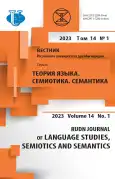Linguocultural Markers of Literary Texts by B.L. Vasiliev
- Authors: Kazyutina E.S.1, Ozerova E.G.2
-
Affiliations:
- Belgorod University of Cooperation, Economics and Law
- Belgorod State National Research University
- Issue: Vol 14, No 1 (2023)
- Pages: 231-244
- Section: SEMIOTICS & FICTION TEXT STUDIES
- URL: https://journal-vniispk.ru/2313-2299/article/view/323459
- DOI: https://doi.org/10.22363/2313-2299-2023-14-1-231-244
- EDN: https://elibrary.ru/PTDKGM
- ID: 323459
Cite item
Abstract
The effectiveness of speech communication depends on the immersion in the uniqueness and specificity of the national culture through the knowledge of reality. A literary text transmits background knowledge and experiences, which in the process of perception are not only interpreted by a reader, but also form the value universals. Dialogue as a form of intercultural communication is due to the impact on the addressee, that is, a pragmatic approach that contributes to: 1) tolerance of thinking, 2) the preservation of traditions and cultural experience, 3) acculturation as a process and result of speech and thought activity. The purpose of the study is to identify linguistic and cultural markers of literary texts by B.L. Vasiliev, which represent the national and cultural specifics of the verbalization of a literary word, since those are linguocultural factors that make it possible to reveal the mental nature of the text and interpret the ethnoculturally conditioned semantic content. The anthropocentric orientation of the communicative-cognitive methodology and the tasks set predetermined the nature of the research methods. The leading method of describing the ethno-cultural universals of a literary text is contextual-semantic, since the actualization of ethno-cultural influence is interpreted in context. The contextual-semantic method allows explore ethnocultural constants in the following areas: 1) identifying and comprehending ethnocultural markers of literary texts by B.L. Vasiliev; 2) perception and interpretation of ethno-cultural constants in the literary texts of B.L. Vasiliev. Note that the literary texts of B.L. Vasilyev allow to form the culture of a reader’s personality.
Keywords
About the authors
Evgenia S. Kazyutina
Belgorod University of Cooperation, Economics and Law
Author for correspondence.
Email: eukaziutina@yandex.ru
teacher of the Russian Language and Business Communications Department
116a, Sadovaya Str., Belgorod, Russian Federation, 308023Elena G. Ozerova
Belgorod State National Research University
Email: ozerova@bsu.edu.ru
Dr. in Philology, Assistant-Professor, Professor of the Russian Language and Russian Literature Department
85, Pobedy Str., Belgorod, Russian Federation, 308015References
- Alefirenko, N.F., Golovaneva, M.A., Ozerova, E.G. & Chumak-Zhun, I.I. (2013). Text and discourse. Moscow: Flinta. (In Russ.).
- Sternin, I.A. (2011). On the concept of linguocultural specificity of language resources. Language. Literature. Culture, 1, 8–22. (In Russ.).
- Berezovich, E.L. (2007). Language and Traditional Culture: Ethnolinguistic Studies. Moscow: Indrik. (In Russ.).
- Kazyutina E.S., Ozerova E.G. RUDN Journal of Language Studies, Semiotics and Semantics, 2023, 14(1), 231–244
- Ozerova, E.G. (2012). Russian lyric-prose text: discursive-cognitive aspect: monograph. Belgorod: BelGU. (In Russ.).
- Prokhorov, Yu.E. (2008). National socio-cultural stereotypes of speech communication and their role in teaching English to foreigners. Moscow. (In Russ.).
- Alefirenko, N.F. (2010). Linguoculturology: Value-semantic space of language. Moscow: Flinta: Nauka. (In Russ.).
- Kubryakova, E.S. (2004). Language and knowledge: on the way to gaining knowledge about language: Parts of speech from a cognitive point of view. The role of language in the knowledge of the world. Moscow: Languages of Slavic culture. (In Russ.).
- Vygotsky, L.S. (1996). Pedagogical psychology, V.V. Davydov (Ed.). Moscow: Pedagogy-Press. (In Russ.).
- Bolotnova, N.S. (2009). Communicative style of the text: dictionary-thesaurus. Moscow: Flinta: Nauka. (In Russ.).
- Jiao, Yuemei. (2012). Literary thought of B.L. Vasilyeva and her educational event on the younger generation in the light of ecofeminist literary criticism. Scientific and pedagogical journal of Eastern Siberia Magister Dixit, 3, 235–246. (In Russ.).
- Himes, D.H. (1975). Ethnography of speech. In: New in linguistics. Iss. VII . Sociolinguistics. Moscow: Progress. (In Russ.).
- Gnisci A. (1999). La letteratura comparata. In: Introduzione alla letteratura comparata. Milano: Bruno Mondadori.
- Alefirenko, N.F., Nurtazin, M.B. & Shakhputova, Z.Kh. (2021). Autochthonous synergy of Russian literary discourse. Russian Language Studies, 19 (3), 253–270. http//dx.doi.org/10.22363/2618-8163-2021-19-3-253-270. (In Russ.).
- Rodionova, O.Yu., Malkova, T.A. & Kharzeeva, L.I. (2017). On the implementation of the educational goal in the process of studying literary texts in the classroom in Russian as a foreign language. In: Foreign languages at the university and school: Collection of articles, Vitebsk, April 21–22, 2017. Vitebsk: Vitebsk State University. pp. 181–182. (In Russ.).
Supplementary files









